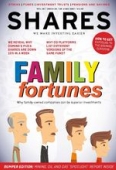Archived article
Please note that tax, investment, pension and ISA rules can change and the information and any views contained in this article may now be inaccurate.
Taken over yet remaining on the stock market

Most takeover offers require shareholders to give up their partial ownership of a company in exchange for cash or shares in the acquirer.
Only in the rarest of occasions does the acquired business remain on the stock market and investors who didn’t accept the takeover offer continue to hold the shares in their portfolio. It’s quite an odd situation and one we believe will soon happen to toy maker Hornby (HRN).
Hornby likely to stay listed
Phoenix Asset Management has become a 55.2% shareholder in Hornby after buying a 20.9% stake from activist investor New Pistoia Income.
Under takeover rules, an individual investor going beyond 29.9% ownership of a business must make an offer for the whole company. That’s why Phoenix how now offered to pay 32.375p per share for the remainder of Hornby it doesn’t already own, a mere 3.6% premium to the share price on the night before the news.
Will investors accept the offer?
Hornby’s board says the offer price ‘significantly undervalues’ the business and its future prospects. While it might be correct, you have to look at the situation from three viewpoints.
Firstly, Hornby has been a disappointing investment for many shareholders, as evidenced by a 65% share price decline over the past two years, according to data from SharePad.
Phoenix’s proposal might act as a reminder to long-suffering investors that they hold Hornby in their portfolio and accepting the offer is an easy way to get out.
Secondly, some investors may be uncomfortable at having a single shareholder own more than half the business, so they might get out.
Thirdly, Phoenix plans to transfer the shares to one of its managed funds, being Aurora Investment Trust (ARR). Do you actually think that investment collective wants to own a whole company? I doubt it. The bid was forced upon Phoenix for technical reasons and not out of desire, in our opinion.
I view Phoenix/Aurora as an investor which wants to help Hornby’s management to repair the business – and ultimately profit from the
share price re-rating that could accompany a successful turnaround.
That is no doubt why it says it wants to maintain Hornby’s AIM listing. Phoenix believes Hornby would ‘benefit from the access to capital and increased profile and transparency that an AIM listing provides’.
I’m sure the other major shareholders would prefer an ongoing listing so they’ve got exposure to a liquid market and can exit once the turnaround plays out. These include asset managers Ruffer (13.19%), Downing (6.54%) and Artemis (3.55%).
Indeed, Downing fund manager Judith MacKenzie told me in April that Hornby’s turnaround could take another three to five years to be realised – so it is hard to see her wanting to sell now in the absence of a generous bid premium.
Who else has been 'taken over' and is still listed?
Equatorial Palm Oil (PAL:AIM) is example of an AIM-quoted company which has stayed on the stock market, despite one of its shareholders having been forced to make a takeover offer.
Malaysian plantations group KLK provided growth finance to Equatorial Palm Oil in 2013 and the structure of the deal saw the partner lift its shareholding from 20.1% to 54.8%.
KLK made an offer to buy the rest of the business but only 8.4% of investors said ‘yes’. As a result Equatorial Palm Oil continues to trade on the stock market as normal albeit with a dominant shareholder which has since gone to 62.86% ownership. (DC)
Important information:
These articles are provided by Shares magazine which is published by AJ Bell Media, a part of AJ Bell. Shares is not written by AJ Bell.
Shares is provided for your general information and use and is not a personal recommendation to invest. It is not intended to be relied upon by you in making or not making any investment decisions. The investments referred to in these articles will not be suitable for all investors. If in doubt please seek appropriate independent financial advice.
Investors acting on the information in these articles do so at their own risk and AJ Bell Media and its staff do not accept liability for losses suffered by investors as a result of their investment decisions.
Issue contents
Big News
Editor's View
Great Ideas Update
Investment Trusts
Larger Companies
Main Feature
Money Matters
Smaller Companies
Story In Numbers
- Petropavlovsk co-founder kicked off the board after 23 years’ service
- Which FTSE 350 Shares have Lost Shareholders Money
- Which FTSE 350 Shares Rewarded Shareholders
- $390bn wiped off global drug sales forecasts
- 98.6% vote in favour of Standard Life/Aberdeen merger
- London’s shrinking bank industry
- 150M Hurricane blows Crystal Amber down

 magazine
magazine









